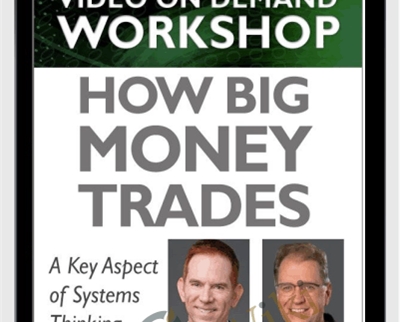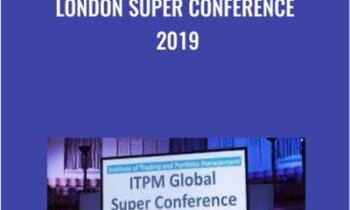How Big Money Trades: A Key Aspect of Systems Thinking – Van Tharp
How Big Money Trades: A Key Aspect of Systems Thinking – Van Tharp Download. Van and Chuck Whitman knew they had hit on something big when they started tea…
Original price was: $1,495.00.$141.00Current price is: $141.00.
Unlock your potential with the How Big Money Trades: A Key Aspect of Systems Thinking – Van Tharp course for only Original price was: $1,495.00.$141.00Current price is: $141.00. at WSOLib.com! Discover our vast library of over 60,000 downloadable digital courses across Forex and Trading. Get expert-guided, self-paced learning and save over 80% compared to retail prices. Transform your skills today!
Salepage link: At HERE. Archive: https://archive.is/wip/AICeQ
This workshop reveals the inside the workings of what “big money” does in the market.
Van and Chuck Whitman knew they had hit on something big when they started teaching this new workshop. Van went on to say it was his favorite workshop in years.
He himself had major paradigm shifts during the workshop.
A Message from Dr. Van Tharp:
I had more paradigm shifts about trading during this workshop than I’ve had in years.
As Chuck Whitman and I were developing this workshop I started to realize we had something special happening. We were delving into the kind of depth and details that I had never been exposed to myself. And, once we started teaching it, I felt like it was lightening in a bottle. What I mean is that this is not the kind of information that I have ever seen before in any kind of trading training. Chuck Whitman really understands how big money moves the market and the amount of edges and strategies that one can create with exposure to this information is infinite. Not only that, but I was particularly blown away by the information the guest speakers brought in.
Because the amount of information seemed to expand as we presented, we added a 5th day to what we thought was a 4 day workshop.
But there were still important topics that we had not covered. So we are adding two more days to this workshop in November.
The other realization that I had was that we had priced this workshop way to low considering the value of the information. The next time we present this workshop it will cost twice as much if not more.
In the meantime you can still get in on the great price and even better still get access to the information.
Purchase the Video-on-Demand recording of the 5 days we presented in August/September. You have a long time to study this material and get caught up for the two extra days in November on Wednesday the 18th and Friday the 20th, 2020.
Read on to learn what is covered in this workshop (both recorded and coming) —Van Tharp
MORE COMING
With more material than could be taught in the original 4 days, Chuck and Van added a 5th workshop day at no charge… but that still was not enough! Now, two additional full days of material will be added to this first-of-its-kind workshop.
COST
We are going to price the entire 7-day workshop at only $1,495*. That’s about half of what we charge for similar workshops of this length and with this type of material.
New to the workshop? For $1,495, and you will get the five days of video-on-demand from the workshop already presented. That will be available as soon as you enroll until the first new session starts. And then you’ll also get the two new live sessions coming in November.
*August Attendees. If you signed up for the 4-day workshop, then you only need to pay $295 more for the extra two days and by paying the nominal extra charge you will also have access to the video-on-demand recording from the time you pay until the 1st new session starts November 18!
RECORDINGS
RECORDING ACCESS EXTENDED:
Recordings for this complete 7-class workshop will be available for unlimited viewing until December 6th. When you register today or tomorrow you can attend the live sessions this week and watch the recordings from August afterward if you don’t have time to watch before the Wednesday or Friday sessions.
Most traders trade primarily to make money in the markets. Right?
And yet . . . most traders are trying to win in a high stakes game they really don’t understand. For example, most traders don’t understand –
- Why or when their systems work.
- Who they are trading against or even the categories of major market participants.
- The difference between price and value – or which to trade.
- How big money drives the market.
- Why to trade with big money.
- How to look at just one or two things beyond price to help confirm a smarter entry or exit.
If you have been trading for a short while and you don’t understand those critical factors, you’re not likely to be around long in the markets. It’s nothing personal, it’s just the markets doing their job.
Would you prefer to trade for the years to come? Would you like to generate more consistent profits and have fewer, smaller drawdowns? Then you better prepare yourself thoroughly. Capital markets attract more knowledgeable, competitive, and savvy players than any other game in the world. Most retail traders fail to prepare or educate themselves – and most get kicked out of the game pretty quickly. Warren Buffet summed up this idea well in his 1988 Berkshire Hathaway annual letter-
As they say in poker, “If you’ve been in the game 30 minutes and you don’t know who the patsy is, you’re the patsy.”
Don’t be a patsy. Prepare yourself and become a professional player.
Prepare Yourself
As a young man, Van Tharp blew up a trading account while he was in graduate school. He saved up some more money and then he blew up his second trading account – the second time finding out that you could go below zero. Van realized the only common element between those two account-draining experiences was “him”. As a psychology Ph.D., he became really curious about what he had just done so he started exploring the psychology of trading – and made numerous exciting discoveries in the following years that helped individual traders.
More than thirty years later, Van is still exploring and still making discoveries that help individual traders. Over the last year, he developed a new course called Trading Genius II where he dissected the invaluable systems thinking approach to trading. In that workshop, we talk about how the market is a process — not a noun and how you only trade your beliefs. In addition, there are many variables involved in what goes on which is why systems thinking becomes so important. For example, Van has identified 11 different types of systems that can impact your trading and he suspects there are a lot more.
The core 11 types of systems include:
- 1. Trading Systems
- 2. You and all the systems involving you (physical, mental, spiritual)
- 3. Market Type
- 4. Using Position Sizing Strategies to Meet Your Objectives
- 5. Underlying Currency (your base currency) and all the things that could act upon it including Fed Action
- 6. Market Environment (with COVID 19 being a good example)
- 7. Regulatory Environment
- 8. How Big Money Plays the Trading Game)
- 9. Ease of Trading (Taxes, free markets, ability to do what you need to do easily such as go short)
- 10. Power and Money Games (The Games that Clare Graves Level 5 people play)
- 11. The Universal Human Game that we talk about in Peak 202.
Not long after teaching that workshop, Van had a conversation with one of his instructors which turned out to be incredibly enlightening for Van about System #8 How Big Money Trades. Van had developed beliefs about this critical area for traders and has general guidelines for how to use those beliefs. This instructor, however, explained in detail how he had structured his trading business based on his professional experience with big money. Van heard about big money in many new ways and was so impressed with the applicability of this knowledge, he invited him to help him create a new course.
The Super Trader is Chuck Whitman, one of Van’s long-time clients. Chuck started as a runner on the floor of the CBOT when he just was a teenager. He went on to become a floor trader, a market maker, and a principal of a large global market-making firm and a top-performing CTA. In other words, Chuck became a big fish in some very big ponds. He knows from three decades of first-hand experience who might be on the other side of your trade – and why they expect to make money on that trade.
Chuck first attended a Van Tharp Institute workshop more than twenty years ago. After some major transformations in Chuck’s life, Van helped Chuck reconnect recently with his passion for teaching and coaching. Since then, Chuck has stepped back from his trading duties slightly and taught a series of workshops for VTI. He just developed this completely new course with Van though he has been sharing these lessons with his private coaching clients for the last few years.
It turns out that everyone one of Van’s core 11 types of systems could be the basis for some sort of trading system or some sort of edge in the market. Thus, we are really excited to be doing this workshop via Zoom for you.
Understanding Big Money and Market Structure
If we are to become successful traders, we must understand market structure.” — Chuck Whitman
Big money moves through and drives different markets somewhat differently – but the effects are undeniable and often detectable. Van often describes Big Money as the unseen power that makes up the markets.
Big money includes governments, central banks, banks, funds, institutions, etc. In most cases, retail traders just don’t have the power to move markets.
Big Money does have the power though and by digging into the mostly unseen underbelly of the market structure, you can adjust to trade with the big money rather than against it.
What is market structure? Generally speaking, Chuck finds four main groups of participants in most capital markets:
- 1. Commercials
- 2. Large Speculators
- 3. Small Speculators
- 4. Market Makers
Within each major asset class, each individual market has a different structure – a different makeup of each category. Each market participant wants to make money but each group attempts that with different objectives, roles, and strategies. As a result, each market “behaves” differently based on its unique structure.
Understanding these elements can help you develop better strategies, execute better, make more money, and help you avoid getting rolled.
Would you like an example?
Look at commodities. You can tell a lot about supply and demand by watching the price for the product in the cash market — where the product is bought or sold and delivered immediately. Commercials (big money) drive the cash market almost exclusively. These companies aren’t trading but instead are buying or selling because they actually produce or use the product in the short term. As a result, the cash market reveals a lot about the supply and demand of any product. When you notice the cash price begin to rally, you can check and see if it’s diverging away from the deferred futures contract price. If so, the supply is getting tight. Strength in commodity price spreads correlates highly to strong trends in future contract prices meaning — the developing trend you see will likely run for a while. Would you like confirmation of a trend? Futures traders can improve the quality of their trades by understanding the dynamics of their market structure — and regularly monitoring the cash market.
We can find another example of understanding market structure in avoiding going off the cliff with an ETF. Exchange-Traded Funds are like mutual funds but they can be easily bought or sold as shares in the equity markets. Some ETFs experiences are constructed with a potential mismatch between the liquidity extended to daily traders of the products and the liquidity of the underlying assets. Traders can move in and out of ETFs with ease but many ETFs cannot easily move in and out of the assets they hold — or construct through complex structurings. Such a mismatch opens up possibilities for default when a moving ETF price cannot match the moving price of the underlying holdings.
We saw a dramatic example of this in February 2018 when the ETF XIV stopped trading. This inverse volatility ETF (short VIX) had been a very crowded trade for many small and large speculators (big money) over the previous years as volatility continued to decline — until it didn’t. A quick 5-6% drop in the S&P panicked investors who started dumping XIV. Big money could tell the long-time one-sided trade was over and that the ETF was in trouble so they helped push the ETF “over the cliff.” As a result, the trading in February 2018 “broke” XIV and wiped out the position of numerous holders of the ETF.
Understanding the market structure of volatility would have allowed you to manage your risk and helped you avoid a painful surprise. Actually, that XIV failed was not a big surprise for the traders who look at ETF construction and understand big money and market structure.
About The Workshop
In this workshop, you will not learn specific trading systems, however, Van and Chuck will help you…
- Think about market functions,
- Understand the market structure,
- Capitalize on your role and as a result,
- Trade more profitably.
Van will present the overarching systems thinking perspective to frame the detailed information Chuck will provide.
In addition, Van and Chuck will discuss most of the 11 areas and how they impact your trading, but the major emphasis of this workshop is how big money trades. At various points in the workshop, Van will interview Chuck to elicit Chuck’s primary beliefs. With a grounding in Chuck’s belief structure, you can better understand him as well as consider how useful Chuck’s beliefs are for you personally.
Chuck’s ability to communicate effectively these beliefs and strategies he developed trading with and against big money will help you understand how those beliefs help keep him successful. He started out as an individual trader and now coaches individual traders so he will talk about these topics in ways that you will understand easily. You could talk to dozens of other knowledgeable individual traders for years but still never hear the lessons Chuck will share in just a few hours.
Specific topics Chuck will cover at the workshop:
- 1. Trading fair value rather than price
- 2. Two types of trading by the commercials
- 3. Commitment of Trader Reports
- 4. Companies managing (manipulating) their stock’s price
- 5. The role that credit plays in predicting Bull and Bear Markets
- 6. CDS and the stock price
- 7. Interest rates and equity trends
- 8. Arbitrage by commercials
- 9. Large speculator strategies
- 10. Small speculator behavior
- 11. Market makers
- 12. Order flow
- 13. Bid-Ask spread (not Big Ass spread)
- 14. Positive vs. Negative Reversion Strategies
In addition, we’ll be talking about systems thinking and the 11 different types of systems that we have so far identified that could impact your trading.
For example, can you imagine a scenario in which the Federal Deficit for the year could be as high as $5-10 trillion; where we have record unemployment; and a number of areas of the economy are likely to go bankrupt (and yet since March we have stocks going up 300% or more).
Why is that?
By digging down into the details of these and other areas, you will be able to…
- Trade like the Pros with a simple entry and exit strategy that captures EDGE and eliminates slippage.
- Understand an array of strategies that Market Makers and Commercials use that could create new ideas for your trading strategies.
- Learn how Pros trade relationships such as spreads and correlations that are more stable than price alone.
- Identify when commercials believe a product has become extremely cheap or expensive so that you can ride their coattails.
- Understand the concept of Fair Value and how professionals determine it to understand when you are buying at great value and when you are overpaying.
- Know when to initiate, add, reduce, or exit positions based on commercial activity and sentiment.
- Add stock price gaming knowledge to improve your returns and decrease your drawdowns.
- Align your trades with some of the biggest money around – central banks. (Puts a whole new meaning to the phrase “Don’t fight the Fed!”)
- Get a jump on individual stock moves by tracking an instrument about which retail traders have no clue but that big money uses all the time.
- Verify your trading strategies fit in and are working with the ecosystem of your market.
- Free yourself from the zero-sum trading mentality and realize trades can be win-win for both parties.
- Fade small speculators consistently at extremes in sentiment.
- Understand how to pick the least capital intensive trade that best expresses your beliefs and strategy.
These are the kind of lessons that can help make you a more consistently profitable trader over the long term — and you can keep using the systems you already have and know. Or you could trade well intermittently between interruptions by various market surprises and frustrations from trying to trade counter-trend never really understanding why your systems don’t work better.
Save some years and generate new profits in the next month from lessons you’ll learn in this workshop!
In August we opened this workshop at a very inexpensive price with the idea of doing four half-day sessions. However, we soon discovered that we had more material than we could possibly cover. We added a fifth day and still did not have the time to include forex or fixed income – some of the biggest markets in the world.
As a result, in November we are going to do How Big Money Trades Part II with two more days to this workshop making it seven half-day sessions!
We would normally charge anywhere from $2,500 to $3,000 for a workshop of this length with this type of content. However, we originally valued it at $1,495. And then we added an extra session at no extra charge.
If you did not get to attend the workshop in August, now you can get the recordings of the first 5 days plus the next two days of live streaming in November and only pay $1,495.
You can watch the 1st workshop as video on demand at your leisure and then attend the two live sessions. The first is Wednesday, November 18 the second is Friday, November 20th.
If you attended the 1st sessions, then we are only charging $295 for the remaining two sessions. And you can also watch the video on demand to refresh your memory and then attend the two new sessions.
Remember the next time we give this workshop live it will be much more expensive, so we encourage you to take advantage of this special offer.
We had several guest speakers join in August who specialize in particular asset classes and gave a huge amount of inside information on those areas. This will be your chance to really see inside the workings of what big money does in the market.
We don’t think a workshop of this nature has ever been offered before. You won’t want to miss it.
And we’ve also decided that Super Trader Foundation members CAN take this important workshop as one of their 7 workshops – even though it wasn’t listed. So if you’ve been thinking about joining the program while we have the GBTC offer, now is the time to do so if you want to get this workshop. And this might be a one-time-only workshop.
Feedback from a recent attendee:
“Awesome and great presentation by Chuck and Van. I totally feel like I received like 6 to 8 times my price of the workshop in just 1 or 2 days. Everything was awesome and Chuck was freaking great. He’s the man!”
Secure your future with the How Big Money Trades: A Key Aspect of Systems Thinking – Van Tharp course at WSOLib.com! Gain lifetime access to expertly curated content, empowering your career and personal development.
- Lifetime Access: Enjoy unlimited access to your digital courses.
- Huge Savings: Prices are consistently up to 80% lower than original sales pages.
- Secure Transactions: Shop with confidence using our trusted payment methods.
- Actionable Knowledge: Acquire real-world skills from diverse topics.
- Instant Delivery: Start learning immediately after purchase.
- Device Flexibility: Access your courses on desktop, mobile, or tablet.
Begin your learning journey with WSOLib.com!
Specification: How Big Money Trades: A Key Aspect of Systems Thinking – Van Tharp
|
User Reviews
Only logged in customers who have purchased this product may leave a review.





There are no reviews yet.